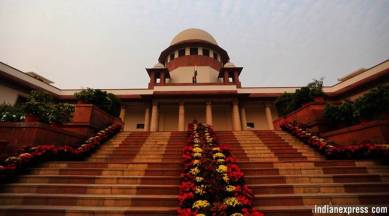[ad_1]
Since then, the Supreme Court has expanded freedoms. It ought to proceed to take action

After over half a decade of deliberations and quite a few iterations of India’s information safety regulation, each homes of Parliament handed the Digital Personal Data Protection Act final month. This comes nearly precisely six years after the judgment in Ok S Puttaswamy vs Union of India, the place the Supreme Court (SC) reaffirmed the suitable to privateness and confused the necessity for a devoted information safety regulation.
The Puttaswamy judgment fashioned the cornerstone of privateness jurisprudence within the nation, holding that the suitable to privateness was an integral a part of the basic rights below the Indian Constitution. Six separate opinions of the Court spelt out an expansive interpretation of the suitable to privateness. The Court construed privateness not as a slim proper in opposition to bodily invasion, however as one that features the physique and thoughts, permits us to make free selections, and is deeply tied to human dignity and autonomy.
This conception of privateness recognises how central it’s to our each day lives. Privacy permits us to make significant selections, for instance regarding our sexual and reproductive well being, alternative of companions, and management over private data. Six years after this wealthy conception of privateness was established, we ask — how has the suitable to privateness advanced within the SC?
You have exhausted your
month-to-month restrict of free tales.
To proceed studying,
merely register or sign up
Continue studying with an Indian Express Premium membership.
This premium article is free for now.
Register to learn extra free tales and entry presents from companions.
Continue studying with an Indian Express Premium membership.
This content material is unique for our subscribers.
Subscribe now to get limitless entry to The Indian Express unique and premium tales.
The SC has explored rules of autonomy, dignity, and identification in relation to privateness to strengthen the framework of constitutional rights. For occasion, it decriminalised all sexual relations between consenting adults, together with adults of the identical intercourse, counting on the suitable to privateness linked with freedom of expression, equality, and non-discrimination. It has, in a number of judgments, reaffirmed the suitable of adults to marry throughout spiritual and caste strains, linking such rights to autonomy and self-recognition. It decriminalised adultery each primarily based on defending sexual autonomy and privateness and on the grounds of extreme state involvement within the married life of people. The Court additionally examined the function of privateness within the context of end-of-life care and reaffirmed the suitable to die with dignity. Since Puttaswamy, the SC has deliberated on and expanded the ambit of the suitable to privateness.
We also can see the results of Puttaswamy percolate by the excessive courts as per the CCG’s High Court Tracker, which tracks the evolution of privateness judgments by excessive courts in India. They have supplied extra nuanced variations of the suitable to privateness, particularly in circumstances referring to the suitable to be forgotten, the place people can ask for details about themselves to be faraway from public information in some circumstances. Privacy, amongst different grounds, has additionally been used as the idea for taking down intimate photographs of people the place they had been shared with out consent. High courts have additionally relied on Puttaswamy to make clear the restrictions on the powers of investigative authorities in relation to surveillance, search and seizure, and DNA testing.
Most Read
However, the suitable to privateness hasn’t at all times prevailed, and the SC has restricted this proper in sure circumstances. For instance, in a break up verdict, the Court restricted the suitable to privateness in public areas and curtailed the suitable of ladies to put on a hijab in academic establishments. The case is now slated to be referred to a bigger bench. Additionally, the Court has additionally determined to overview its verdict within the Sabarimala case, which struck down the customary prohibition on ladies between the ages of 10-50 from coming into the Sabarimala shrine.
Over the following few years, the Court can even be confronted with deciding on different key points that can form the evolution of basic rights and freedoms within the nation. For occasion, it should resolve on the continuing case referring to the State’s alleged use of the Pegasus suite of spy ware on Indian residents, and can ship its judgment on the suitable to marry for people from the LGBTQIA+ group. Contentious provisions of the Digital Personal Data Protection Act are additionally prone to be challenged quickly, and the Court will probably be referred to as upon to interpret provisions of the regulation because it’s enforced. Since Puttaswamy, the Court has steadily constructed up jurisprudence that has expanded the scope of the suitable to privateness, and it ought to proceed to take action to permit people to extra successfully train their rights and freedoms in India.
Giridhar is mission supervisor and Singh is programme officer, Centre for Communication Governance, National Law University, Delhi
© The Indian Express (P) Ltd
First revealed on: 13-09-2023 at 06:40 IST
[adinserter block=”4″]
[ad_2]
Source link